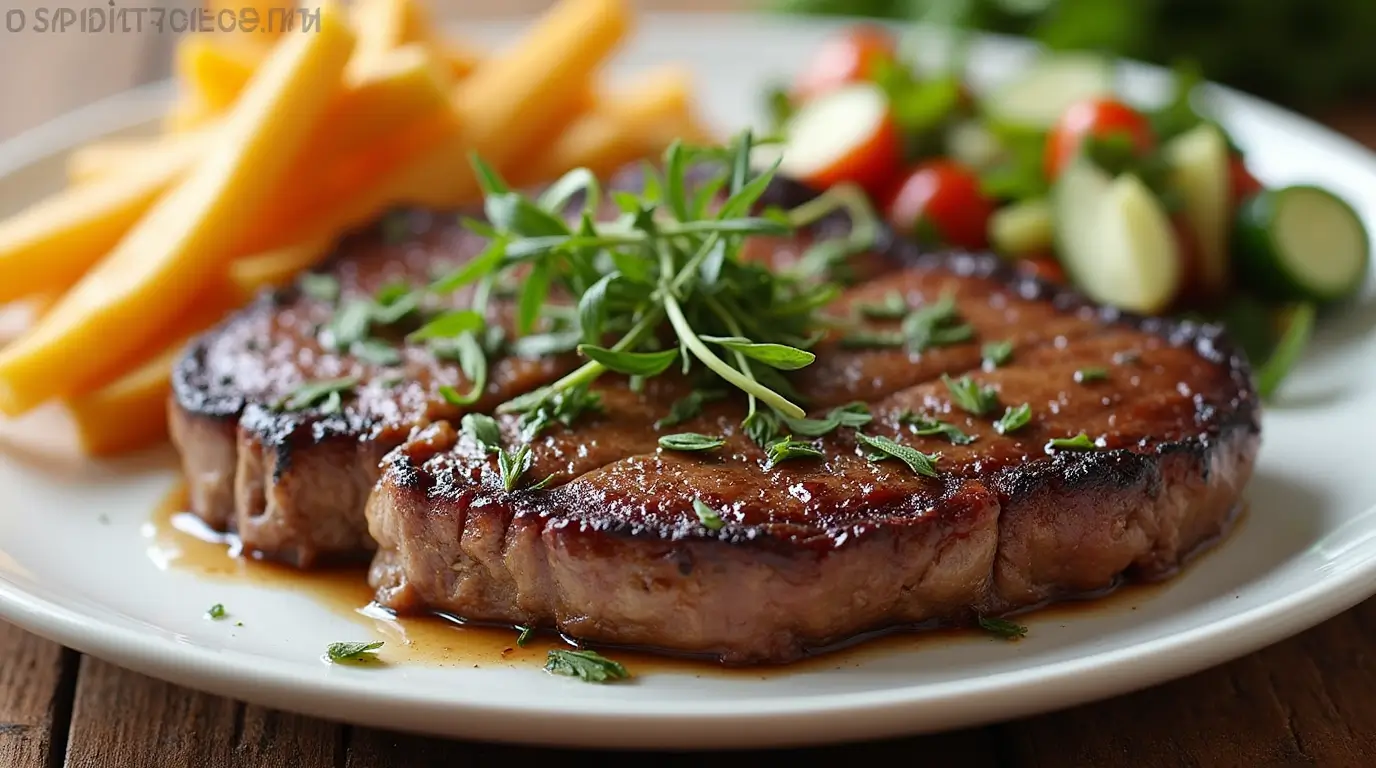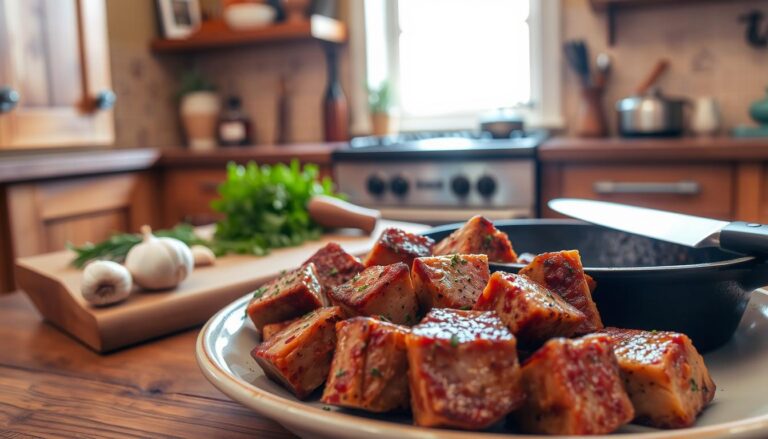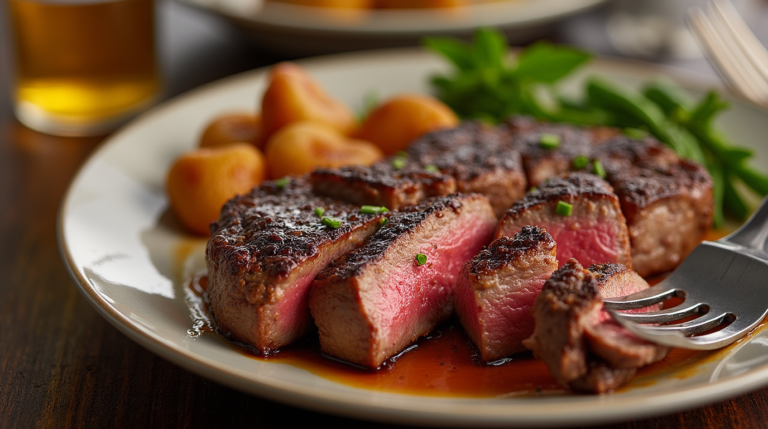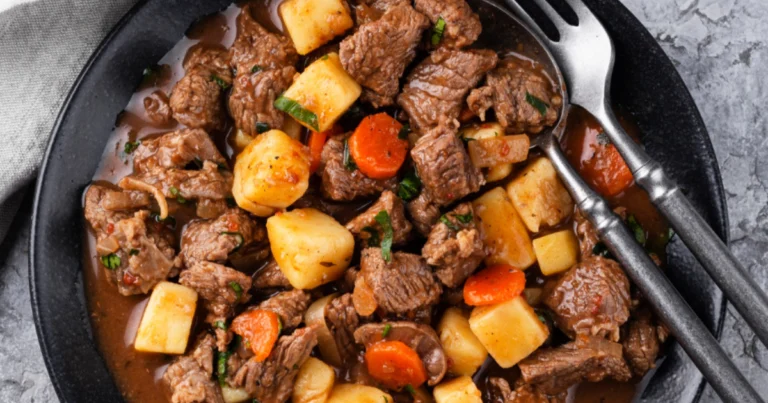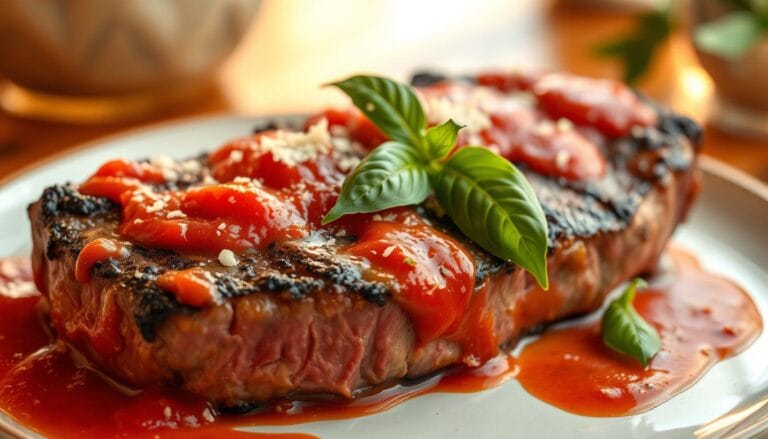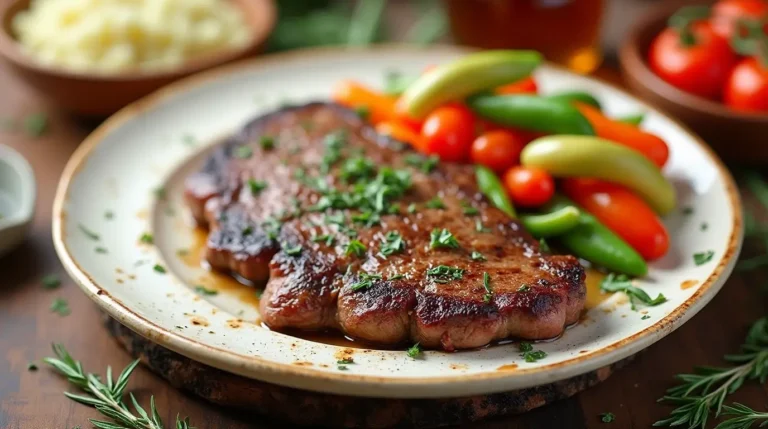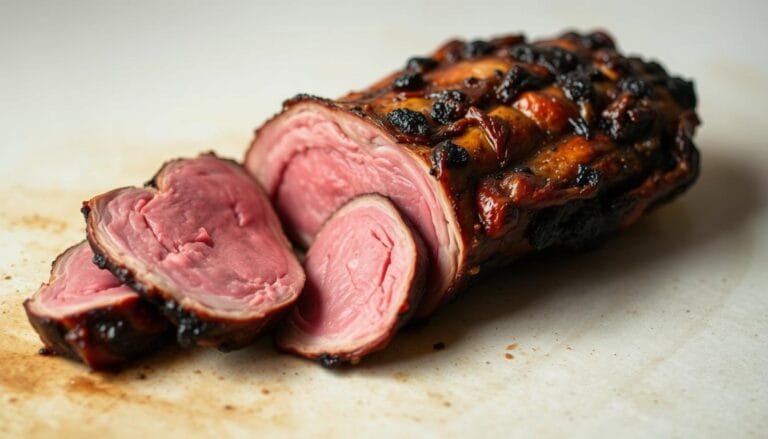How to Cook Denver Steak,A Perfect Recipe for Delicious Meal
The first time I sliced into a perfectly cooked Denver steak, I knew I had found something special. This hidden gem of beef cuts makes any dinner extraordinary. If you’re wondering how to cook Denver steak, you’re about to start a delicious journey.
Denver steak is a budget-friendly yet flavorful choice for meat lovers. It’s found beneath the shoulder blade, offering tenderness and marbling like more expensive steaks. Learning to cook Denver steak is more than just technique—it’s unlocking a culinary experience that will wow your family and friends.
Whether you’re an experienced home cook or just starting out, this guide will help you. You’ll learn how to select the perfect cut and master cooking temperatures. Soon, you’ll be making restaurant-quality meals in your own kitchen. Get ready to turn an affordable cut of meat into a memorable dining experience.
Table of Contents
What is Denver Steak?
Denver steak is a hidden gem in the world of beef. It has become popular among meat lovers and home cooks. This cut comes from the chuck roll, specifically the underblade muscle. It offers exceptional flavor and tenderness.
Introduced in the early 2000s, Denver steak was created by the Beef Checkoff Program. They aimed to market less-known beef cuts for better eating experiences. Butchers and meat experts found this muscle to be unique and special.
A Fascinating Origin Story
The journey of Denver steak started with meat scientists. They looked at beef carcasses for high-quality muscles. They found the underblade muscle could be tender and flavorful, like expensive steaks.
- Discovered in early 2000s
- Part of Beef Checkoff Program research
- Sourced from chuck roll section
Nutritional Powerhouse
Understanding Denver steak’s nutritional profile is key. It’s packed with nutrients, making it great for health-conscious eaters.
| Nutrient | Amount per 3 oz serving |
|---|---|
| Protein | 22g |
| Iron | 2.2mg |
| Zinc | 5.4mg |
| Vitamin B12 | 2.4mcg |
The Denver steak is a nutritional powerhouse. It’s a great protein source with essential vitamins and minerals. Its flavor and nutrition have made it a culinary star.
Choosing the Right Cut of Meat
Choosing the perfect Denver steak starts with knowing what makes it special. Denver steaks are hidden gems in the beef world. They offer rich flavor and tenderness that can make your cooking better.
Identifying Quality Denver Steak
When looking for a top-notch Denver steak, watch for these important traits:
- Look for consistent marbling throughout the meat
- Seek cuts approximately 1 inch thick
- Choose steaks weighing between 12-14 ounces
- Check for a deep red color with white fat streaks
Marbling is key in denver steak seasonings and flavor. The fat patterns make the meat tender and tasty when cooking.
Where to Buy Denver Steak
Finding the perfect Denver steak takes some smart shopping. Your best bets are:
- Local butcher shops specializing in premium cuts
- Specialty meat markets
- High-end grocery stores with dedicated meat departments
- Online meat delivery services
Pro tip: Get to know your local butcher. They can help you find the best cuts and offer tips on preparing Denver steak.
Professional chefs say to ask your butcher about the steak’s origin and muscle characteristics for the best cooking results.
Preparing Denver Steak for Cooking
Before you start cooking your Denver steak, proper preparation is key. It unlocks its incredible flavor. Learning how to cook Denver steak starts with the right marinading and seasoning techniques. The goal is to enhance the meat’s natural richness without overpowering its taste.
Marinades that Elevate Flavor
A great denver steak recipe starts with a thoughtful marinade. Not all marinades are created equal. The right combination can transform your steak from good to extraordinary. Consider these marinade options:
- Classic Herb Marinade: Olive oil, balsamic vinegar, minced garlic, fresh thyme
- Robust Red Wine Marinade: Red wine, soy sauce, crushed rosemary, cracked black pepper
- Citrus Zest Marinade: Lemon juice, orange zest, olive oil, fresh oregano
Mastering Dry Aging at Home
Dry aging can dramatically improve your Denver steak’s tenderness and flavor. While professional dry aging requires special equipment, home cooks can try simplified methods:
- Use a dedicated refrigerator space
- Invest in a wire rack for air circulation
- Maintain consistent temperature between 34-38°F
- Control humidity levels around 80-85%
Pro tip: For home dry aging, always start with high-quality, fresh meat from a trusted butcher.
Remember, when preparing your Denver steak, less is often more. Simple seasonings like kosher salt and freshly ground black pepper can highlight the meat’s natural qualities. Your goal in learning how to cook Denver steak is to complement, not mask, its inherent deliciousness.
Cooking Methods for Denver Steak
Learning to cook Denver steak well involves two main techniques: grilling and pan-searing. These tips will help you make a tasty meal that shows off the steak’s special flavor and softness.
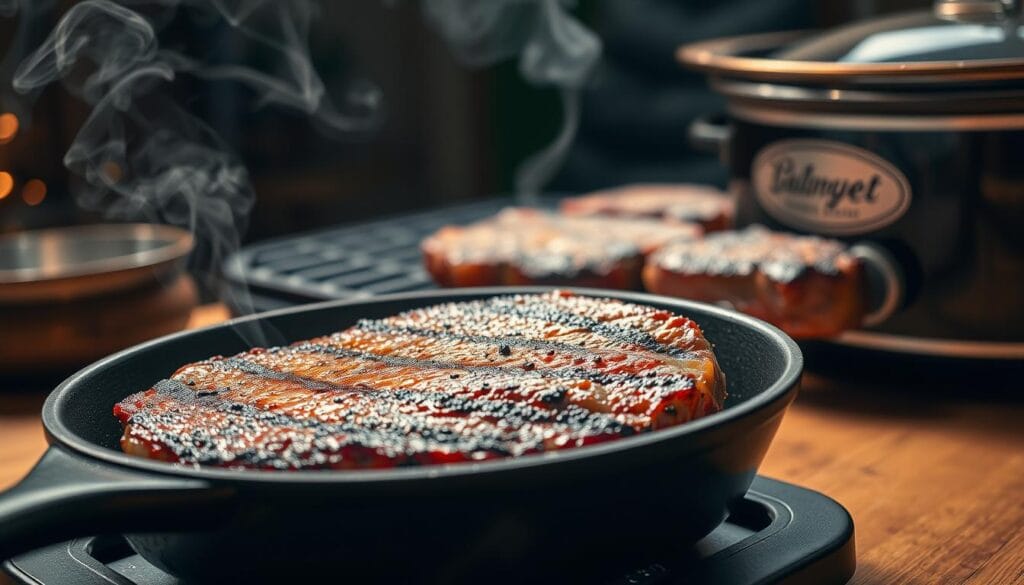
Grilling Your Denver Steak to Perfection
Grilling is a great way to cook Denver steak, bringing out bold flavors. It doesn’t matter if you use gas or charcoal. The important thing is to keep the heat steady and time it right.
- Preheat grill to medium-high heat (450°F)
- Season steak with salt and pepper
- Cook 4-5 minutes per side for medium-rare
- Use a meat thermometer to check internal temperature
- Rest steak 5-10 minutes before serving
“The secret to a perfect Denver steak is patience and precise temperature control.”
Pan-Searing for Maximum Flavor
Pan-searing in a cast-iron skillet is another top choice for cooking Denver steak. It makes a tasty crust and keeps the inside juicy.
- Select a well-marbled steak, 1 inch thick
- Season and let rest at room temperature
- Preheat cast-iron skillet to 500°F
- Use high smoke point oil like canola
- Sear 3-4 minutes per side
- Optional: Finish in 400°F oven for thicker cuts
Pro tip: Always slice against the grain to ensure maximum tenderness when serving your perfectly cooked Denver steak.
Ideal Cooking Temperatures
Mastering the perfect temperature is key when cooking denver steak. You want a tender cut that highlights the meat’s flavor and texture. It’s all about precision and careful monitoring.
The right cooking temperature is crucial for a great denver steak. It ensures a juicy, flavorful steak that will wow meat lovers.
Using a Meat Thermometer
Accurate temperature is vital for perfectly cooked denver steak. Get a reliable meat thermometer for consistent results:
- Insert the thermometer into the thickest part of the steak
- Avoid touching bone or fat for precise reading
- Check temperature periodically during cooking
Understanding Doneness Levels
Different doneness levels need specific internal temperatures. Here’s a guide to help you get the perfect result:
| Doneness Level | Internal Temperature | Appearance |
|---|---|---|
| Rare | 125°F | Cool red center |
| Medium Rare | 130-135°F | Warm red center |
| Medium | 140-145°F | Pink center |
| Medium Well | 150-155°F | Slight pink center |
| Well Done | 160°F+ | No pink |
“The secret to a perfect denver steak is patience and precision in temperature control.”
Pro tip: Remember that carryover cooking means your steak will keep rising in temperature after you take it off the heat. Take the steak off a few degrees before your target temperature to avoid overcooking.
Slicing and Serving Denver Steak
Preparing and serving your denver steak recipe needs care and precision. The last steps of your denver steak cooking journey can make the whole dining experience better.
Mastering the Art of Slicing
Learning how to cook denver steak means knowing the right slicing technique. Always slice your steak against the grain for tenderness. This way, each bite is more enjoyable.
- Identify the grain direction by looking at the muscle lines
- Use a sharp knife for clean, precise cuts
- Cut perpendicular to the muscle fiber lines
- Aim for slices about 1/4 to 1/2 inch thick
Perfect Pairing Sides
Pair your denver steak with sides that bring out its rich flavor. Here are some tasty options:
- Roasted rosemary garlic potatoes
- Grilled asparagus with lemon zest
- Creamy blue cheese coleslaw
- Sautéed mushrooms with thyme
By following these tips, you’ll make your denver steak a dish that wows everyone.
Flavorful Denver Steak Recipes
Take your cooking to the next level with these delicious denver steak recipes. They’ll turn your kitchen into a fancy restaurant. The right seasonings can make your meals unforgettable, impressing everyone at the table.
Cooking denver steak is easy with the right techniques and seasonings. You can make dishes as good as those in restaurants right at home.
Classic Grilled Denver Steak
Here’s how to make a tasty grilled denver steak:
- Choose a top-quality denver cut
- Pat the steak dry with paper towels
- Season well with salt and black pepper
- Heat your grill to high (around 450°F)
Here’s when to flip for the perfect doneness:
| Doneness | Cooking Time | Internal Temperature |
|---|---|---|
| Rare | 3-4 minutes per side | 125°F |
| Medium-Rare | 4-5 minutes per side | 135°F |
| Medium | 5-6 minutes per side | 145°F |
Denver Steak Tacos: A Culinary Twist
Turn your denver steak into a lively taco dish with these seasonings:
- Chili powder
- Cumin
- Garlic powder
- Smoked paprika
Thinly slice the grilled steak against the grain. Serve it in warm corn tortillas with fresh salsa, crisp cilantro, and a squeeze of lime. It’s a zesty meal that will brighten up your dinner.
Storing Leftovers
Mastering denver steak cooking tips means knowing how to store your leftover meat properly. After enjoying a delicious meal, you’ll want to preserve your Denver steak’s flavor and quality.
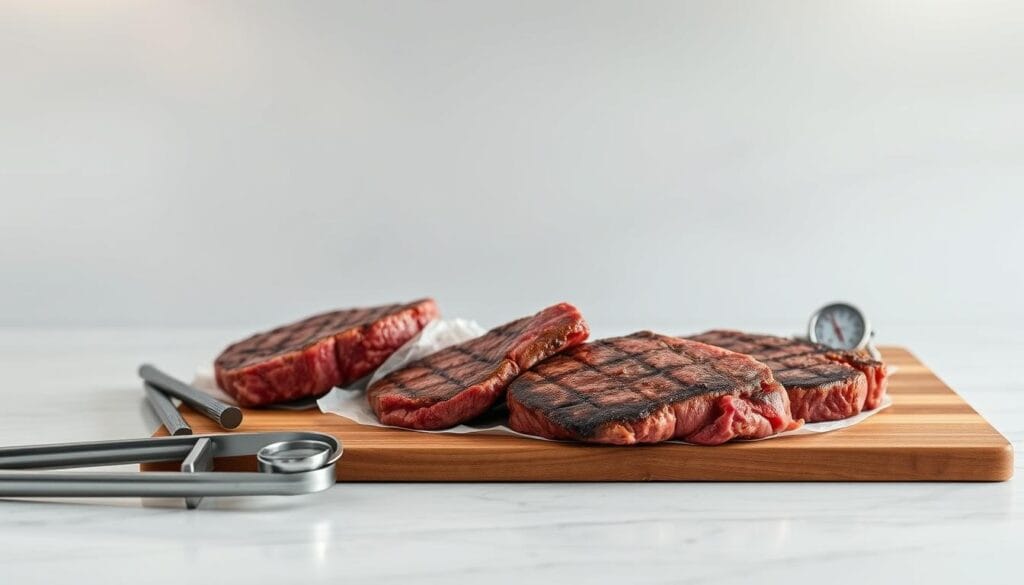
Best Practices for Refrigerating
When storing leftover Denver steak, follow these key guidelines for how to cook denver steak and maintain its freshness:
- Cool the steak at room temperature for no more than two hours
- Wrap tightly in plastic wrap or aluminum foil
- Store in an airtight container
- Refrigerate at 40°F or below
- Consume within 3 days
Freezing Denver Steak for Extended Storage
Freezing offers an excellent way to extend your steak’s shelf life. Proper packaging is crucial for maintaining quality.
- Cool steak completely before freezing
- Wrap tightly in plastic wrap
- Remove as much air as possible
- Place in a freezer-safe bag
- Label with the date of freezing
“The key to great leftover steak is careful storage and gentle reheating.” – Professional Chef
When freezing, your Denver steak can maintain optimal quality for up to 3 months. When ready to enjoy, thaw slowly in the refrigerator overnight to preserve texture and flavor.
Reheating Tips
To maintain the steak’s juiciness when reheating, use these denver steak cooking tips:
- Preheat oven to 250°F
- Use a wire rack over a baking sheet
- Heat until internal temperature reaches 110°F
- Quickly sear in a hot skillet for 60 seconds per side
Avoid microwave reheating, which can dry out your steak and compromise its delicious texture.
Tips for Perfectly Cooked Denver Steak
Mastering denver steak cooking tips means understanding the fine details of meat preparation. You aim to make a dish that wows everyone with its rich, tender flavors. Professional chefs know that cooking denver steak well is more than just throwing it on a hot surface.
One key to perfect results is avoiding common mistakes. Many home cooks overcook the steak, ruining its delicate texture. Always let your meat rest at room temperature before cooking. Use a reliable meat thermometer to check the internal temperature. Slice against the grain for maximum tenderness and to avoid tough bites.
To enhance flavor, use strategic techniques that take your denver steak to the next level. Try using compound butter with fresh herbs like rosemary or thyme, which melts beautifully over a hot steak. A sprinkle of high-quality flaky sea salt just before serving can also boost the taste. Experiment with different seasonings to find your favorite.
Remember, practice makes perfect when cooking denver steak. Each time you cook, you’ll get better and more confident. Focus on details like preheating your cooking surface, using the right seasoning, and letting it rest long enough. With patience and these tips, you’ll create unforgettable meals every time.
FAQ
What exactly is a Denver steak?
How do I choose the best Denver steak at the store?
What are the best cooking methods for Denver steak?
What’s the ideal internal temperature for Denver steak?
How should I season my Denver steak?
How long can I store leftover Denver steak?
Is Denver steak a nutritious choice?
Can I cook Denver steak from frozen?
Did You Try This Recipe ?
There are no reviews yet. Be the first one to write one.

